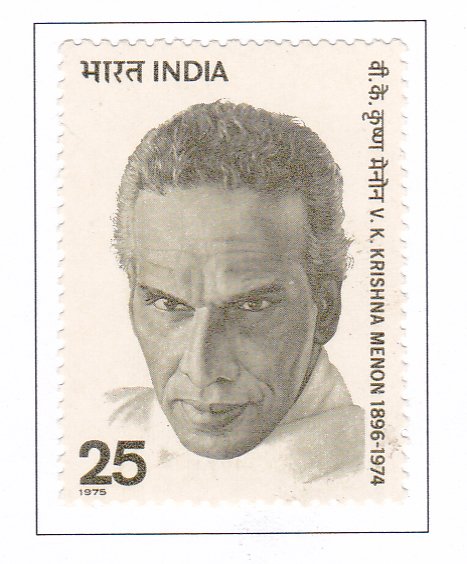1st Death Anniversary of Vengalil Krishnan Krishna Menon(1896-1974)

Technical Data
| Stamp Set | Personality Series |
|---|---|
| Date of Issue | October 24, 1975 |
| Denomination | 25 p |
| Quantity | 3,000,000 |
| Perforation | comb 13 x 13½ |
| Printer | Security Printing Press, Nashik |
| Watermark | No Watermark |
| Colors | Olive |
| Catalog Codes |
Michel IN 652 Stamp Number IN 698 Yvert et Tellier IN 455 Stanley Gibbons IN 786 |
| Themes | Famous people | Men | Statesmen |
Vengalil Krishnan Krishna Menon, born on May 3, 1896, in Panniyankara, Calicut, Kerala, was the third son of Komath Krishna Kurup, a successful lawyer. Raised in a modestly well-to-do family, Menon received his early education in Tellicherry and later obtained his B.A. degree from the Madras Presidency College.
During his college years, Menon became actively involved in the national movement. His association with Annie Besant and the Home Rule Movement shaped his political consciousness. Recognizing his potential, Besant sent him to England in 1924. In London, Menon emerged as a passionate advocate for India’s freedom. He founded the India League in 1928, which became a significant platform for nationalist activities in England.
Menon’s influence extended to the Labour Party, where he became an effective spokesperson. He was elected as St. Pancras Borough Councilman on the Labour ticket in 1934, and his advocacy earned him the Freedom of the Borough. Menon also pursued a legal career, representing the interests of the poor.
His friendship with Jawaharlal Nehru, which began in 1935, was significant. Nehru recognized Menon’s contributions to the national cause and his role in facilitating India’s peaceful transfer of power.
From 1952 to 1953 and from 1954 to 1962, Menon led the Indian delegation to the United Nations, where he played a crucial role in shaping the policy of non-alignment. He made significant contributions to diplomacy, advocating for world peace, socialism, and national liberation. Menon actively participated in resolving international crises such as the Korean and Suez crises.
In 1953, Menon became a member of the Rajya Sabha, and in 1956, he joined the Union Cabinet as Minister without Portfolio. He was elected to the Lok Sabha from Bombay in 1957 and became Defence Minister in the same year. In this role, he worked tirelessly to modernize India’s defence forces and implemented far-reaching reforms.
Following the Chinese aggression in 1962, Menon resigned from the Cabinet but continued to be active in national and international affairs. He passed away on October 6, 1974, leaving behind a legacy of dedicated service to India and its people.
